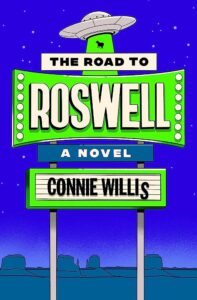I sometimes wonder if people understand irony. Alanis Morissette wrote a song called “Ironic” in which all of the situations she describes aren’t really ironic. They’re bad timing, bad planning, or just plain bad luck. But irony they ain’t.
Francie Driscoll understands irony, though. She’s in Roswell (yes, that Roswell) to save her friend Serena from marrying a UFO nut who thinks aliens are here wandering around on earth. This isn’t the first time she’s rescued Serena from a bad marriage. She’s not entirely happy about this—after all, she certainly doesn’t think that aliens are real, or that they have landed here on planet Earth, or that they are in the habit of abducting human beings. Yet here she is, in a day-glow green bridesmaid dress, surrounded by people who truly do believe all of that and would give anything to meet an alien or even be abducted by one.
It’s more than a little ironic then, that the one person who thinks that Roswell, aliens, alien abductions, and the whole alien-industrial complex that has sprung up is just so much malarkey actually get abducted by an alien.
That folks, is irony writ large. It’s even more ironic that the alien in question looks nothing like contemporary descriptions of aliens (i.e., Greys, Nordics, or Reptilians). In fact, when Francie first sees the alien (who later gets nicknamed “Indy” for reasons that are far too complicated for me to describe succinctly without giving too much away) Francie mistakes him for a tumbleweed.1
That’s pretty much the first chapter. I checked this book out from the library and thought I would read it over the course of a couple of weeks. But I managed to read it in three days. Yeah, it’s that good.
Initially, Francie tries to escape from the alien, but when she realizes that he is just as lost and confused as she is, she decides to try to help him. Along the way, the two of them manage to pick up a hitchhiker named Wade (who is a conman, but of a different sort), a sweet little old lady named Eula Mae who has an unhealthy relationship with casinos, a western movie loving RV owner names Joseph who takes everything in stride, and a highly strung UFO-chasing enthusiast named Lyle who believes more than he should about aliens.
All in all, this is an exciting, entertaining romp. The story takes a number of twists and turns that I didn’t expect, and was a lot of fun to read. This was the first Connie Willis novel I have read, but it certainly won’t be the last. If you are looking for something that has some high stakes in it but it is still light-hearted (think Galaxy Quest) this is right up your alley. I highly recommend it.

What I most enjoyed was the description of Indy and the other aliens, who are apparently plant-based life forms. (Three of them are described as “yucca,” “ball of twine”, and “cabbage.” These ain’t your average Vulcan.) They are just alien enough to put me in mind of the stories of the late Stanley Weinbaum who created a truly unique alien in his short story “A Martian Odyssey”.
It has been argued that Weinbaum’s Tweel was the first character to satisfy John W. Campbell’s challenge to “write…a creature who thinks as well as a man, but not like a man.” Like Tweel, Indy is neither a monster nor a human-like creature, but something utterly unique as an alien, at least in my experience.
If the novel has a fault, it’s when Indy’s people finally arrive on Earth. For as different as they are physically from us, they are still sticklers for protocols and discussion and endless meetings. And that means that despite their outward appearance, they are very much like us. The only thing missing is the endless series of PowerPoint presentations.
There’s nothing wrong with this, of course. One of the abilities (if not one of the purposes) of science fiction is to point out how ridiculous humans can be by projecting our behavior onto some other species. In which case, fair enough. These scenes at the end prove this point. It’s just that they slow the book down a bit too much for me. Your mileage may vary—you may not find this to be true. Then again, I have lived through entirely too many meetings which could have just been an email.
Notes
1 Tumbleweeds aren’t native to North America. They are in fact, alien to these shores.
Works Cited
Willis, Connie. The Road to Roswell. New York: Del Rey, 2023. Book.
https://bookblog.kjodle.net/2023/09/17/road-to-roswell-by-connie-willis/

